小学英语五年级上册复习知识点
人教版小学英语五年级上册各单元知识点
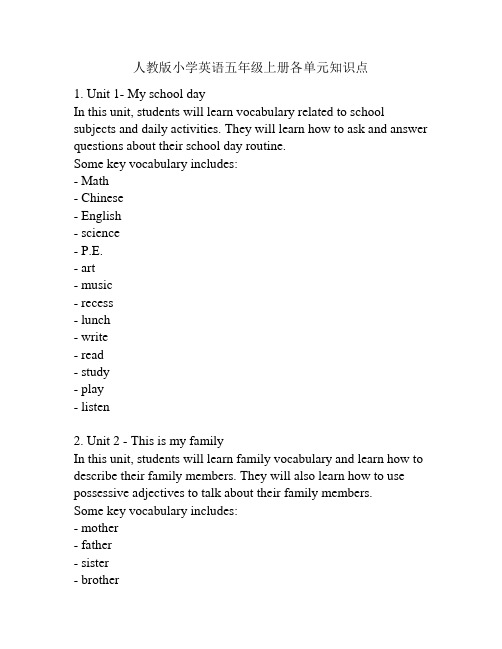
人教版小学英语五年级上册各单元知识点1. Unit 1- My school dayIn this unit, students will learn vocabulary related to school subjects and daily activities. They will learn how to ask and answer questions about their school day routine.Some key vocabulary includes:- Math- Chinese- English- science- P.E.- art- music- recess- lunch- write- read- study- play- listen2. Unit 2 - This is my familyIn this unit, students will learn family vocabulary and learn how to describe their family members. They will also learn how to use possessive adjectives to talk about their family members.Some key vocabulary includes:- mother- father- sister- brother- grandmother- grandfather- aunt- uncle- cousin- daughter- son- possessive adjectives (my, your, his, her)3. Unit 3 - At the zooIn this unit, students will learn vocabulary related to animals and their habitats. They will also learn how to talk about what animals can do (i.e. run, swim, fly, etc.).Some key vocabulary includes:- lion- tiger- elephant- giraffe- monkey- panda- kangaroo- penguin- habitat (forest, desert, ocean, etc.)- can/can't4. Unit 4 - My homeIn this unit, students will learn vocabulary related to the rooms in a house and furniture. They will also learn how to use prepositions to describe where things are in a room.Some key vocabulary includes:- living room- kitchen- bedroom- bathroom- dining room- sofa- table- chair- bed- closet- prepositions (on, under, next to)5. Unit 5 - My scheduleIn this unit, students will learn how to talk about their daily schedules and activities. They will also learn vocabulary related to time and daily routines.Some key vocabulary includes:- wake up- brush teeth- take a shower- go to school- come home- eat dinner- do homework- bed time- time (hour, minute, second)6. Unit 6 - My hobbiesIn this unit, students will learn how to talk about their hobbies and interests. They will also learn vocabulary related to differenthobbies and sports.Some key vocabulary includes:- play soccer- dance- sing- draw- swim- ride a bike- play the piano- watch TV- read books- hobby- interest7. Unit 7 - Our worldIn this unit, students will learn vocabulary related to different countries and cultures. They will also learn how to ask and answer questions about different places in the world.Some key vocabulary includes:- country- flag- language- symbol- landmark- continent- questions (What's the capital of...? What language do they speak in...?)8. Unit 8 - Let's celebrate!In this unit, students will learn vocabulary related to holidays andcelebrations. They will also learn about different traditions and customs around the world.Some key vocabulary includes:- Halloween- Thanksgiving- Christmas- New Year's Day- Valentine's Day- Easter- tradition- custom- celebrateOverall, these units will help students develop their language skills in various areas such as vocabulary acquisition, grammar usage, and communication. By the end of the fifth grade, students will have a foundation of English language that will prepare them for more complex language use in the future.In addition to the vocabulary and grammar covered in these eight units, there are also important language skills that students will develop, such as reading comprehension and writing ability. Throughout the units, students will be completing various reading activities to help them understand and contextualize the new vocabulary and grammar they are learning. They will also be practicing writing skills, such as paragraph writing and short answer responses.Reading comprehension is a vital skill for English language learners, as it helps students to understand and interpret new information. In each unit, there will be reading passages related to that unit's topic. For example, in Unit 3, students may read aboutdifferent animal habitats and learn how animals adapt to their environment. Reading comprehension activities may include reading comprehension questions, matching exercises, and writing exercises. By the end of each unit, students should have a solid understanding of the reading material and be able to answer questions related to the content.Writing is another essential skill that students will develop throughout these units. Writing exercises will be incorporated into each unit, helping students to practice writing in English and apply the new vocabulary and grammar they are learning. Some writing exercises may include writing short paragraphs about their hobbies or describing their family members. By the end of the fifth grade, students should be able to write coherent paragraphs with proper grammar, spelling, and punctuation.Speaking and listening skills will also be developed through group and partner activities in each unit. Students will be encouraged to ask and answer questions in English, and engage in conversations with their peers. They will also have opportunities to give short presentations on topics related to each unit, which will help them develop their public speaking skills.Overall, these eight units are designed to provide a comprehensive language learning experience for students in fifth grade. By the end of the program, students should be able to understand and use everyday English vocabulary and grammar in a variety of contexts. They should also be able to read and comprehend short passages, write short paragraphs independently, and engage in conversations and presentations with their peers. It is important to note thatlanguage learning is a gradual process, and students will vary in their language proficiency at the end of the program. However, with consistent practice and dedication, students in fifth grade will be well-prepared for more advanced language learning in the future.。
小学五年级上册英语知识点

小学五年级上册英语知识点一、词汇与拼写1. 掌握基本的英语单词和常用表达2. 熟悉常用的英语词汇和拼写规则3. 学会利用英语词汇构建简单的句子二、语法知识1. 名词:掌握名词的单复数形式及其用法,如可数名词与不可数名词的区别2. 代词:了解人称代词与物主代词的使用方法,如I, he, she, it, my, your等3. 动词:掌握常见动词的基本形式和过去式,如go-went, eat-ate等4. 形容词和副词:学会形容事物特征和表示程度的词语,如happy, sad, fast等5. 冠词:了解冠词a和an的使用规则,如a book, an apple等6. 介词:熟悉常见的介词及其用法,如in, on, at等7. 时态:掌握一般现在时和一般过去时的基本用法,如I play, He played等8. 疑问句和否定句:了解一般疑问句和否定句的构成,如Do you like? No, I don't等三、听力技巧1. 听懂简单的英语对话和指令2. 学会通过听力材料获取基本的信息和理解意思3. 提高听辨英语音标和各种语音的能力四、口语表达1. 提高口语表达的流利度和准确度2. 学会用简单的句子进行日常生活对话3. 表达自己的感受、意见和需求五、阅读理解1. 阅读简短的英语文章,了解文章基本内容2. 掌握提取关键信息的能力,如答案所在的句子或段落3. 学会利用已知信息推断文章中未知的内容六、写作技巧1. 能够书写简单的英文句子和段落2. 学会运用所学词汇和语法知识进行简单的组织与表达3. 提高书写规范性和准确性,注意基本的拼写和标点符号使用小学五年级上册英语知识点总结完毕。
以上内容主要涵盖了词汇与拼写、语法知识、听力技巧、口语表达、阅读理解和写作技巧等方面的内容。
通过学习这些知识点,学生们能够提高英语听说读写的能力,为今后的学习打下坚实的基础。
希望大家能够在学习过程中不断积累,勇于表达,逐渐提升自己的英语水平。
小学五年级上学期英语第一单元知识点总结

一、UNIT 1 Greetings 基础知识
1、外研版小学英语五年级上册Unit1 Greetings 的话题是Greetings(问候),学习目标为:
1).能够熟练地使用日常问候语来表达自己的问候;
2).能够正确使用自己所学习的对话句型并能理解其中含义;
3).能够通过听、说、读练习,灵活运用问候语;
4).能够正确使用问候语及一般礼貌用语;
5).能够运用只言片语来表达自己的问候。
2、随着学习过程中,孩子们也学习到了新单词及词组,包括多种问候语,表示自己的问候:
hello/Hi:表示问候的话“嗨,你好!”
good morning:早上好
good afternoon:下午好
good evening:晚上好
good night:晚安
how are you?:你好吗?
I’m fine, thank you.:我很好,谢谢。
and you?:你呢?
see you:再见
3、在本单元中,孩子们还学习了告别用语,如:
Goodbye.:再见
Bye-bye.:再见
Take care.:保重
See you soon.:一会见
See you later.:晚点见
Have a nice day.:祝你今天愉快
4、此外,在本单元中,孩子们学习了一些礼貌用语,如:
Please.:请
Thank you.:谢谢
Excuse me.:对不起
I’m sorry.:对不起
5、在本单元的情景交际部分,孩子们学习了用以表达时间的短语,如:
It’s…:现在是…点了。
小学五年级上册英语期末重点知识复习资料

小学五年级上册英语期末重点知识复习资料学习英语,利用多媒体渠道—单词、母语朗诵录音和图片—使你可以在路上与母语使用者打交道时、日常生活或家庭生活中以及工作中掌握有用的单词和短语。
下面是为大家精心整理的有关小学五年级上册英语期末重点知识复习资料汇总,希望对你们有帮助!小学五年级上册英语期末重点知识复习资料汇总1Unit 1 What’s he like?1. 描述人的外貌单词old 老的young 年轻的tall 高的short 矮的fat 胖的thin 瘦的2. 描述人的性格的单词kind 和蔼的strict 严厉的polite 有礼貌的clever 聪明的hard-working 努力的helpful 乐于帮助人的3. 重点句型(1)---Who’s your English/ music/art/science/maths/Chinese teacher? (谁是你的英语/音乐/美术/科学/数学/语文老师?)---Mr. /Miss./Mrs./Ms. Jones. 琼斯先生/琼斯小姐/琼斯太太/琼斯女士(2)---What’s she/he like? ---She/He is clever.对人的性格和外貌提问,可用上面表示外貌和性格的单词回答。
(3)---Is he/she strict? 他/她严厉么?肯定回答Yes, he/ she is. 是,很严厉。
否定回答No, he/ she isn’t. 不,不严厉。
Unit 2 My week1.星期一到星期天首字母要大写。
Monday 星期一(Mon.) Tuesday 星期二(Tues.)Wednesday 星期三(wed.) Thursday 星期四(Thur.)Friday星期五(Fri.) Saturday 星期六(Sat.)Sunday 星期天(Sun.)2.watch TV 看电视do homework 家庭read books 看书wash my clothes洗衣服play football踢足球3.本单单元重点学习怎样问星期及怎样回答。
小学英语五年级上册复习资料

五年级上期英语复习资料一、易混词整理can can’t cat cake kite mouse mouth能不能猫蛋糕风筝老鼠嘴meat meet thank think fine five肉遇见谢谢认为好的五you your Ms Mrs Miss Mr boy toy你你的女士夫人小姐先生男孩玩具and at too two door doll和在也二门玩具娃娃it’s its look book cook food foot它是它的看书烹饪食物足green grey/gray four for seven eleven 绿色灰色是为,给七十一eight eat nine line twelve twenty 八吃九线十二二十present parents say see ball tall礼物父母说看见球高的farmer father his he’s him head hand农民父亲他的他是他(宾格)头手in on under arm farm art her here 在……里/上/下手臂农场美术她的这里eye ear they them pear bear眼睛耳朵他们他们(宾格)梨熊who whose year ear cool cold 谁谁的年耳朵凉爽的冷的wind windy sun sunny snow snowy 风有风的太阳晴朗的雪下雪的rain rainy bed bad sweater weather 雨下雨的床坏的毛衣天气coat goat boat by buy close clothes外套山羊船乘(交通工具)买关上服装shirt skirt white write tree train衬衫短裙白色写树火车house horse chess cheese far car房子马象棋奶酪远的小汽车fruit foot ship sheep house horse水果足轮船羊房子马old cold will well hair here hear her老的冷的将好头发这里听到她cloud cloudy housework homework our or云多云的家务劳动家庭作业我们的或者take talk love live ride read带走谈话爱居住骑读wear where there those these this these穿哪里那里那些这些这个这些of for fourteen forty fifteen fifty......的为,给十四四十十五五十floor four tea team Chinese China地板四茶运动队中国的中国start star late let room zoo开始星星晚的让房间动物now how grass class cup cap现在怎样草班级,课杯子帽子people pupil purple cook took map cap人们小学生紫色烹饪带走(过去式)地图帽子teach teacher drive driver say see sea教教师驾驶司机说看见海洋二、动词过去式原形---过去式不规则变化am/is --- was 是are --- were是buy---bought 买come --- came 来drink---drank 喝,饮draw--- drew 画drink --- drank 喝do --- did 做eat---ate 吃fall --- fell 下落;摔倒find --- found 发现go --- went 去get --- got 得到give --- gave 给find---found 发现,找到have --- had 度过,有make --- made 制作meet---met 看见;见take---took 带,拿,乘坐lose---lost 丢失learn --- learnt 学习ring---rang 响ride---rode 骑run --- ran 跑see --- saw 看到send --- sent 发送;寄sing --- sang 唱swim---swam 游泳take --- took拍摄tell---told 告诉win---won 赢得write --- wrote 写原形+ dtie--- tied 系,绑live --- lived居住dance --- danced 跳arrive---arrived 到达phone --- phoned 打电话原形+edcook --- cooked 煮东西climb---climbed 爬help --- helped 帮助laugh--- laughed 笑jump---jumped 跳play --- played 玩row --- rowed 划船visit---visited参观,旅游,拜访talk --- talked 说visit---visited 参观walk---walked 步行wash---washed 洗work --- worked 工作watch --- watched 看paint--- painted 涂色stay---stayed 停留原形去y + iedcarry --- carried 搬运;带cry --- cried 哭study --- studied 学习双写末尾字母+ eddrop---dropped 掉落skip---skipped 跳绳travel --- travelled 旅行原型保持不变cut--- cut 剪put--- put放三、语法知识整理2.加动词原形助动词:do,don’t, does, doesn’t,did,didn’t情态动词: can ,can’t, could, couldn’t, should,shouldn’t,must部分短语:want to, have to(不得不)3.a/an 用法绝大多数以元音字母(a,e,i,o,u)开头的单词都是用an,以辅音字母开头的都是用a。
小学五年级英语上册《易错点总结》复习必备

五年级英语上册《易错点总结》期末复习必备一、语法易错点1. a, an的选择: 元音字母开头的单词用an,辅音字母开头的单词用a。
2. am,is,are的选择:单数用is,复数用are,I 用am,you 用are。
3. have,has 的选择: 表示某人有某物.单数用has ,复数用have,I,you 用have。
4. there is, there are 的选择:表示某地有某物,某人.单数用there is,复数用there are。
5. some, any 的选择:肯定句用some, 疑问句和否定句用any。
6. 疑问词的选择:what (什么) who (谁) where (哪里) whose (谁的) why(为什么)when(什么时候)which(哪一个)how old (多大) how many (多少)how much(多少钱)二、形容词比较级当我们需要对事物作出比较时,需要用到比较级。
比较级的句子结构通常是:什么+ 动词be (am , is , are ) + 形容词比较级+ than(比)+ 什么如:I'm taller and heavier than you. (我比你更高和更重。
)An elephant is bigger than a tiger. (一只大象比一只老虎更大。
)形容词的比较级是在形容词的基础上变化而来的,它的变化规则是:①一般的直接在词尾加er,如tall - taller,strong - stronger,②以e结尾的,直接加r,如fine –finer,③以辅音字母加y结尾的,先改y为i再加er,如funny-funnier④双写最后的字母再加er,如big–bigger,thin–thinner ☆注意☆比较的两者应该是互相对应的可比较的东西。
典型错误:My hair is longer than you.(我的头发比你更长。
五年级上册英语重点考点

五年级上册英语重点考点
以下是五年级英语上册的一些重点考点,仅供参考:
1.词汇:学习和掌握教材中出现的重点词汇,包括名词、动词、形容词、副词等,能够正确拼写和使用这些词汇。
2.语法:熟悉和理解一般现在时、现在进行时、一般过去时等基本时态的用法,能够正确运用动词的时态形式。
3.句型:掌握常见的英语句型,如肯定句、否定句、疑问句、祈使句等,能够正确构建和使用这些句型。
4.阅读理解:培养阅读理解能力,能够阅读并理解简单的英语文章,提取关键信息,回答相关问题。
5.听力理解:通过听力练习,提高听力理解能力,能够听懂简单的英语对话和短文。
6.写作:能够用简单的英语进行书面表达,包括书写短文、描述人物、事物等。
7.口语:能够进行简单的英语口语交流,如问候、介绍自己和他人、表达喜好等。
8.词汇扩展:学习一些与日常生活、学校、家庭等相关的词汇,扩大词汇量。
9.语音语调:注意英语的发音和语调,尽量模仿标准的英语发音。
10.文化背景:了解一些英语国家的文化背景和习俗,增进对英语语言和文化的理解。
这些考点仅为一般性指导,具体的重点考点可能因教材版本和教学要求而有所不同。
建议你参考教材和教师的教学要求,以及进行相关的练习和测试,以更好地掌握五年级英语上册的重点内容。
人教版五年级上册英语书unit1知识点
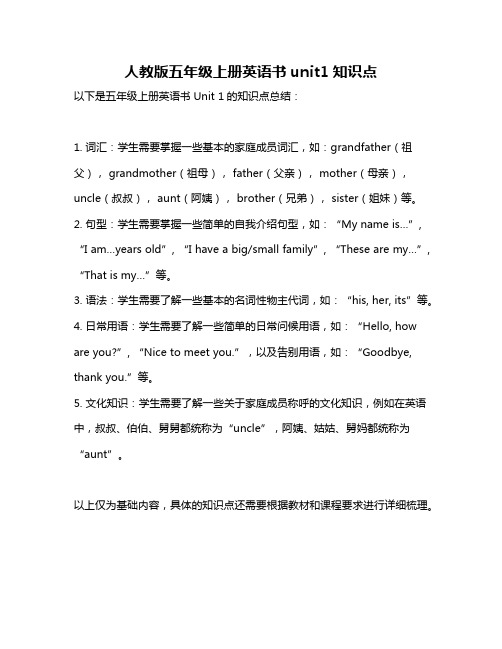
人教版五年级上册英语书unit1知识点
以下是五年级上册英语书Unit 1的知识点总结:
1. 词汇:学生需要掌握一些基本的家庭成员词汇,如:grandfather(祖父), grandmother(祖母), father(父亲), mother(母亲),uncle(叔叔), aunt(阿姨), brother(兄弟), sister(姐妹)等。
2. 句型:学生需要掌握一些简单的自我介绍句型,如:“My name is…”, “I am…years old”, “I have a big/small family”, “These are my…”, “That is my…”等。
3. 语法:学生需要了解一些基本的名词性物主代词,如:“his, her, its”等。
4. 日常用语:学生需要了解一些简单的日常问候用语,如:“Hello, how are you?”, “Nice to meet you.”,以及告别用语,如:“Goodbye, thank you.”等。
5. 文化知识:学生需要了解一些关于家庭成员称呼的文化知识,例如在英语中,叔叔、伯伯、舅舅都统称为“uncle”,阿姨、姑姑、舅妈都统称为“aunt”。
以上仅为基础内容,具体的知识点还需要根据教材和课程要求进行详细梳理。
人教版小学五年级英语上册复习重点知识

班别 ------------ 姓名---------------Unit1 My new teachers重点单词: old 年老的young年轻的funny滑稽的tall高的short矮的strong 强壮的kind 亲善的thin 瘦的active主动的smart 聪慧的strict严格的like像principal校长university student高校生he‵s=he is 他是who‵s=who is谁是Mr 先生Miss 小姐Mrs已婚女士重点句子:1、A:Who is your math teacher谁是你的数学老师?B:M r Li 李先生。
2、A:What is he like他长得怎么样?B:He is tall an strong.他及高又强壮。
3、A:Who is that lady ?那个女士是谁?B:She is our principal.她是我们的校长。
4、A:Is she strict她严格吗?B:Y es,she is.〔确定答复〕是的,她严格。
No,she is not.〔否认答复〕不,她不严格。
5、I have a new math teacher.我有一位新的数学老师。
Unit2 My days of the week重点单词:Monday 星期一Tuesday星期二Wednesday星期三Thursday星期四Friday星期五Saturday星期六Sunday星期日do homework做家庭作业watch TV看电视read books读书play computer games玩电脑嬉戏do housework做家务often通常重点句子:1、A:What day is it today今日星期几?B:It is Monday.星期一。
2、A: What do you have on Wednesday s 星期三你都有什么课?B:We have English 、science and computer on Wednesday s.我们星期三有英语、科学和计算机。
外研版(三起)英语五年级上册 全册知识点归纳

小学五年级英语上册知识点汇总一、动词过去式:go went buy-bought 二、短语:口1eet-metrun-ranModule 1see-sawdrop-droppedcome came do-didam/is-was are werel.went to London 去伦敦 2.a little boy一个小男孩3.see f r om above the ground从地面上空看e back =be back回来e back from+采地从某地回来6.live i n居住在7.livein+地点住在某地8.live near+地点/人住在某地/某人附近9.look at sb/sth看某人/采物10、wait for sb 等候某人1 l、hurry up 赶快12.by bus乘公交车13. w alk to school步行去学校14.send you an email给你发一封电子邮件15.a postcard from Lingling 一封来自玲玲的邮件16.went to the park去公园17 .Sam and Amy”s friend萨姆和艾米的朋友18.run to the bus跑向公i\19.go home 田家三、句子及语法:l、…Did you come back yesterday? 你们昨天回来的吗?句型结构:Did+主语+动词原形+其他答语:肯定:Yes,主语+di d2、--No,we came back last Sunday.3、Let’s buy some.我们买一些吧否定:No,主语+di d n’tLet’s+动词原形我们做……去。
巴4、Wait for me. 等等我5、I dropped my ice cr巳am.我的;水洪淋掉了。
6、We bought ice cream.我们买了一些冰洪i:林。
7、We went home by bus.我们坐公汽回家。
小学英语五年级第一学期全册知识点复习整理归纳
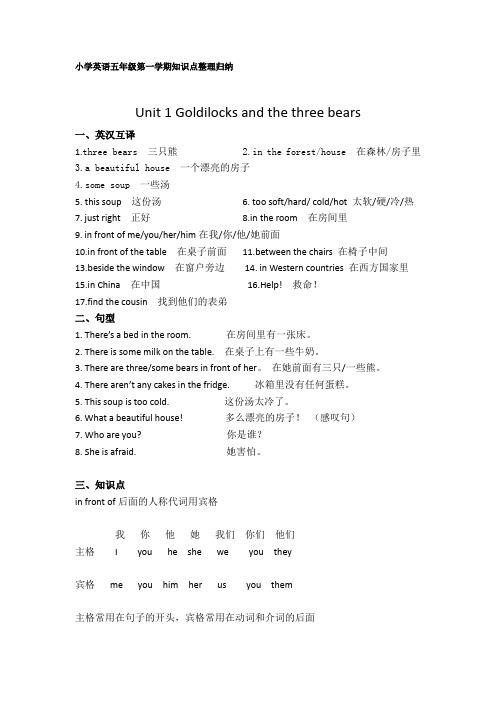
小学英语五年级第一学期知识点整理归纳Unit 1 Goldilocks and the three bears一、英汉互译1.three bears 三只熊2.in the forest/house 在森林/房子里3.a beautiful house 一个漂亮的房子4.some soup 一些汤5. this soup 这份汤6. too soft/hard/ cold/hot 太软/硬/冷/热7.just right 正好8.in the room 在房间里9.in front of me/you/her/him在我/你/他/她前面10.in front of the table 在桌子前面11.between the chairs 在椅子中间13.beside the window 在窗户旁边14.in Western countries 在西方国家里15.in China 在中国16.Help! 救命!17.find the cousin 找到他们的表弟二、句型1. There’s a bed in the room. 在房间里有一张床。
2. There is some milk on the table. 在桌子上有一些牛奶。
3. There are three/some bears in front of her。
在她前面有三只/一些熊。
4. There aren’t any cakes in the fridge. 冰箱里没有任何蛋糕。
5. This soup is too cold. 这份汤太冷了。
6.What a beautiful house! 多么漂亮的房子!(感叹句)7. Who are you? 你是谁?8. She is afraid. 她害怕。
三、知识点in front of后面的人称代词用宾格我你他她我们你们他们主格I you he she we you they宾格me you him her us you them主格常用在句子的开头,宾格常用在动词和介词的后面Unit 2 A new student一、英汉互译1.a new student一名新学生3.the first/second/third floor第一层/第二层/第三层4.on the first/second/third floor在第一层/第二层/第三层5.in our school 在我们学校6.in the playground 在操场上7.on the swing 在秋千上8.push me 推我9.too high 太高 10.go and play 去玩11.our classroom 我们的教室12.go and have a look 去看一看13.so heavy 这么重14.Stop!停下!二、句型1.--- Is there a music room?有一间音乐室吗?--- Yes, there is./ No, there isn’t. 是的,有。
人教版小学五年级上册英语知识点【1-6单元】
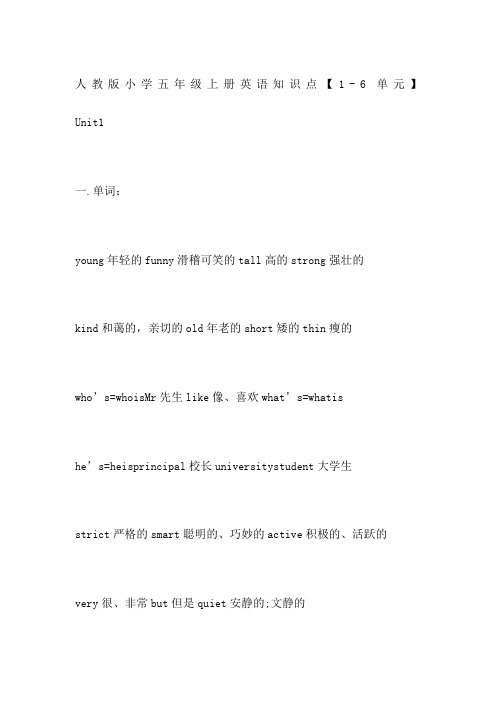
人教版小学五年级上册英语知识点【1-6单元】Unit1一.单词:young年轻的funny滑稽可笑的tall高的strong强壮的kind和蔼的,亲切的old年老的short矮的thin瘦的who’s=whoisMr先生like像、喜欢what’s=whatishe’s=heisprincipal校长universitystudent大学生strict严格的smart聪明的、巧妙的active积极的、活跃的very很、非常but但是quiet安静的;文静的she’s=sheis二.句子:1.A:Who’syourEnglishteacher你的英语老师是谁B:MrCarter.卡特先生.2.He’sfromCanada.他来自加拿大。
3.A:What’shelike他什么样B:He’stallandstrong.他又高又壮。
He’sveryfunny.他很滑稽。
(Who,What引导的特殊疑问句,用来对不熟悉的老师进行问答:Who's+某人What'she/shelikeHe/Sheis+与身体特征和性格特征有关的形容词。
)4.A:W ho’sthatyounglady/那个年轻的女士是谁B:She’sourprincipal.她是我们的校长。
5.Ihaveanewmathteacher.我有一位新数学老师。
6.Herclassissomuchfun.她的课非常有趣。
7.She’sauniversitystudent.她是一名大学生。
8.A:Isshequiet她很安静吗B:No,sheisn’t.She’sveryactive.不是的。
她很活跃的。
(Is引导的一般疑问句,谈论某位老师是否具有某方面的特征:Ishe/she+与身体特征和性格特征有关的形容词,回答用:Yes,he/sheis.No,he/sheisn't.)9.A:Isshestrict她很严格么B:Yes,sheis,butshe’sverykind.是的,但她很和蔼的。
五年级上册英语单元考点

五年级上册英语单元考点五年级上册英语通常涵盖一系列的单元和主题,每个单元都有其特定的考点和重点。
以下是可能包含在五年级上册英语课程中的一些单元考点:Unit 1: Greetings and Introductions问候语和介绍:学生需要学会用英语进行基本的问候和自我介绍。
Unit 2: Numbers and Counting数字和计数:学生需要掌握基本的数字和计数,包括数字的读法和书写。
Unit 3: School Life学校生活:学生学习有关学校、教室、课程等方面的词汇和表达方式。
Unit 4: My Family and Friends我的家庭和朋友:学生学习家庭成员、朋友以及相关的描述性词汇。
Unit 5: Daily Routines日常生活:学生学会描述每天的日常活动和常见动词的用法。
Unit 6: Food and Healthy Habits食物和健康习惯:学生学会有关食物、饮食和健康方面的词汇和表达。
Unit 7: Hobbies and Leisure Activities爱好和休闲活动:学生学习描述自己的爱好和参与休闲活动时的表达方式。
Unit 8: Weather and Seasons天气和季节:学生学习有关天气和季节的词汇,以及描述天气状况的表达。
Unit 9: Holidays and Celebrations节日和庆典:学生学习有关不同节日和庆典的词汇和文化知识。
Unit 10: Travel and Transportation旅行和交通工具:学生学会描述旅行和不同交通工具的词汇和表达方式。
这些单元考点可能包括词汇、语法、听力、口语和阅读等方面。
具体的考点和要求可能会因学校、地区和教材的不同而有所变化。
建议学生在学习每个单元时重点关注相关的语言技能和知识点,并进行适当的练习和巩固。
小学英语五年级上册知识点(集锦22篇)

小学英语五年级上册知识点(集锦22篇)小学英语五年级上册知识点第1篇短语:1、what time 几点钟2、go to bed 上床睡觉late for school 上学迟到4、in the morning 在早上5、at half past seven 在七点半at+时间点在点half past+数字点半6、do exercise 做操do morning exercises 做早操7、in the playground 在操场上8、want to do 想要做某事9、play with sb 和某人玩句子:1、--What time is it now?--It’s half past--What time is it now?--It’s +时间点。
2、I don’t want to be late for school3、--What time do you get up?--I get up at half past4、--What time does your school start?--My school starts at nine o’clock in the5、She always wants to语法:一般现在时一般现在时:表示经常发生的动作或目前的状况。
第三人称单数做主语,动词词尾加“s”动词词尾加“s”规则:1)直接加2)以o、s、x、sh、ch结尾,加es3)“辅音字母+y结尾”,变y为i加es肯定句:Sb(三单)+动词s+其它。
否定句:Sb(三单)+doesn’t+动词原形+其它。
(句中加doesn’t,动词还原,其余不变)一般疑问句:Does+某人+动词原形+其它?(句首加does,动词还原,其余不变)Yes,sb No,sb doesn’其它人称做主语,动词用原形肯定句:Sb+动词+其它。
否定句:Sb+don’t+动词原形+其它。
(句中加don’t,其余不变) 一般疑问句:Do+某人+动词原形+其它?(句首加do,其余不变)Yes,sb No,sb don’小学英语五年级上册知识点第2篇一.单词:air-conditioner 空调curtain 窗帘trash bin 垃圾箱closet 壁橱;衣橱mirror 镜子end table 床头柜bedroom 卧室kitchen 厨房bathroom 卫生间living room 客厅;起居室in 在…里面on 在…上面接under 在…下面near 在旁边behind 在…后边over 在……上方in front of 在……前面clothes 衣服二.句子:this your bedroom? 这是你的卧室吗?------Yes, it 是的,它是。
五年级上册英语常用语法

五年级上册英语常用语法
以下是五年级上册英语中一些常用的语法知识点:
1. 现在进行时:表示正在进行的动作或存在的状态。
结构为“be动词+动词ing”。
例如,“I am playing football”。
2. 动词ing形式:动词的一种形式,表示进行中的动作。
在英语中,动词ing形式常作主语、宾语、表语等。
3. 形容词比较级:形容词的一种形式,表示比较关系。
一般在形容词后加“-er”。
例如,“taller”。
4. 序数词:表示顺序的数词。
在英语中,序数词在句子中作主语、宾语、表语等。
例如,“first”。
5. 冠词:用在名词前,帮助说明名词的含义。
在英语中,冠词分为不定冠词“a”和“an”和定冠词“the”。
6. 情态动词:表示能力、可能性、必要性等的动词。
在英语中,常见的情态动词有“can”、“may”、“must”等。
7. 陈述句:表示陈述事实或观点的句子。
在英语中,陈述句的语序一般为主语+谓语+宾语。
8. 祈使句:表示请求、命令、建议等的句子。
在英语中,祈使句的语序一般为动词原形+其他成分。
9. 疑问句:表示疑问或询问的句子。
在英语中,疑问句的语序一般为疑问词+助动词+主语+谓语+其他成分。
10. 感叹句:表示感叹或强调的句子。
在英语中,感叹句的语序一般为感叹词+陈述句。
以上是五年级上册英语中的一些常用语法知识点,通过学习和掌握这些知识点,可以更好地理解英语语言结构,提高英语应用能力。
最新版小学五年级英语上册知识点大全

最新版小学五年级英语上册知识点大全Unit 1 What's he like?重点单词old 老的,年纪大的 young 年轻的,岁数不大的 funny 滑稽的,可笑的 kind 体贴的,慈祥的,宽容的 strict 要求严格的,严厉的 polite 有礼貌的,客气的shy 羞怯的,腼腆的,怕生的 helpful 有用的,愿意帮忙的clever 聪明的,聪颖的 hard-working 工作努力的,辛勤的music 音乐 art 美术 science 科学 English 英语 maths/math 数学Chinese 语文,中文 sometimes 有时,间或 robot 机器人speak 会说,会讲(某种语言);用(某种语言)说话重点句子1. —Who's your art teacher? 谁是你的美术老师? —Mr. Jones.琼斯老师。
2. —Is he young? 他年轻吗?—Yes, he is. 是的,他年轻。
—No, he isn't. 不,他不年轻。
3. —What's Wu Yifan like? 吴一帆怎样? —He's hard-working. 他很勤奋。
4. Ms Wang will be our new Chinese teacher. 王老师会成为我们的新语文老师。
5. He is very helpful at home. 他在家很能干。
6. Robin is short but strong. 罗宾个子矮,但是身体强壮。
7. He can speak Chinese and English. 他会说中文和英语。
8. He makes me finish my homework. 他让我写作业。
语音字母y在单词中的发音:1、双音节或多音节词末发[ i ]。
例:baby happy windy sunny sorry candy many family party婴儿开心的有风的晴朗的对不起糖果许多家庭聚会课外补充:2、y在单音节词末发[ ai ]例:by 乘坐 my 我的 why 为什么 cry 哭 fly 飞重点知识及语法1、询问他人的外貌或性格:-What's he/she like? - He/She is kind/…2、一般疑问句的问与答:—Is he/she…?—Yes, he/she is. —No, he/she isn't.—Do you know…? —Yes, I do. —No, I don't3、be动词的三种形式am, is, are与人称代词连用的用法:I + am,He, she, it,人名、物名+ isWe, you, they + are4、Ms., Miss, Mr., Mrs.的区别:Ms. [miz](缩略词)(用于女子的姓氏或姓名前,不指明婚否)女士;Miss [mis](用于未婚女子的姓氏或姓名前,以示礼貌)小姐,女士;Mr. [mistE](mister的缩略词)(用于男子的姓氏或姓名前)先生;Mrs. [misiz](用于已婚女子的姓氏或姓名前)太太;夫人。
人教版小学五年级上册英语知识点【1-6单元】.doc
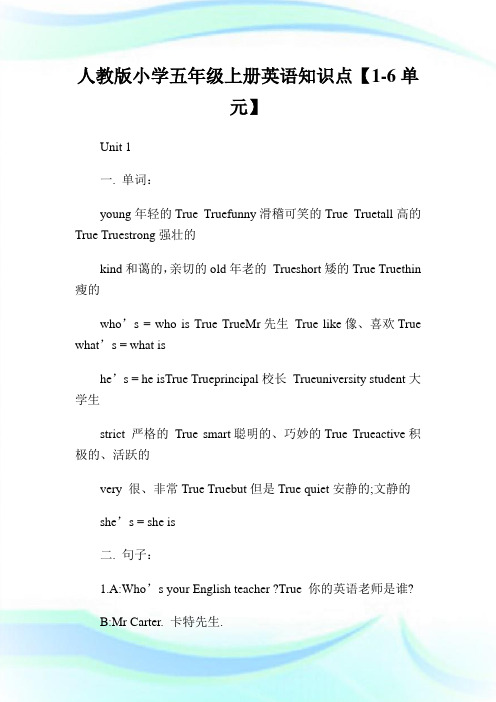
人教版小学五年级上册英语知识点【1-6单元】Unit 1一. 单词:young年轻的True Truefunny滑稽可笑的True Truetall高的True Truestrong强壮的kind和蔼的,亲切的old年老的Trueshort矮的True Truethin 瘦的who’s = who is True TrueMr先生True like像、喜欢True what’s = what ishe’s = he isTrue Trueprincipal校长Trueuniversity student大学生strict 严格的True smart聪明的、巧妙的True Trueactive积极的、活跃的very 很、非常True Truebut但是True quiet安静的;文静的she’s = she is二. 句子:1.A:Who’s your English teacher ?True 你的英语老师是谁?B:Mr Carter. 卡特先生.2. He’s fromTrueCanada. 他来自加拿大。
3. A:What’s he like ?True 他什么样?B: He’s tall and strong .True 他又高又壮。
He’s very funny.True 他很滑稽。
(Who,What引导的特殊疑问句,用来对不熟悉的老师进行问答:Who's + 某人?What's he / she like? He / She is + 与身体特征和性格特征有关的形容词。
)4.A: Who’s that young lady/? 那个年轻的女士是谁?B:She’s our principal. 她是我们的校长。
5.I have a new math teacher. 我有一位新数学老师。
6.Her class is so much fun.True 她的课非常有趣。
7.She’s a university student.True 她是一名大学生。
外研(一起点)小学英语五年级上册知识点

外研(一起)五年级Module1知识汇总一、词汇bench(长凳)playground(操场,运动场)for(达,计)different(不同的)then(那么,就)二、习惯搭配i n China在中国o n the floor在地板上l ook different看起来不同f eed the birds喂鸟t he pictures of.........的照片l ots of许多i n the classroom在教室里l ook at...看......三、重点句型:1.描述某处有某人/某物的句型:There is+可数名词单数/不可数名词+其他.There are+可数名词复数+其他.eg:1.There is a bird on the tree.2.There are some books in the schoolbag.2.描述某处以前没有某物的句型:There wasn’t+可数名词单数/不可数名词+其他+before.There weren’t+可数名词复数+其他+before.eg:1.There wasn’t a river here before.2.There weren’t any benches in this park before.The/This/That+物品名称+is+形容词. eg:1.This supermarket is big.2.That apple is red.1.介绍“今天是某个节日”的句型:T oday is+节日.eg:T oday is Christmas.2.描述“某个节日在什么季节”的句型:节日+is in+季节.eg:Halloween is in winter.外研(一起)五年级Module4知识汇总一、单词1.stories(s tory的复数形式)故事2.invitation请帖3.November十一月4.from(表示时间)从……起5.to直到6.reply回答,回复二、习惯搭配1.tidy up收拾,整理2.my birthday party我的生日聚会3.have lunch吃午餐4.have a birthday cake吃生日蛋糕5.after lunch午餐后6.in the river在河里7.see a film看电影8.tell stories讲故事9.at the weekend在周末10.on Saturday在星期六11.make a birthday cake做一个生日蛋糕三、惯用表达1.Oh yes!哦,好的!四、重点句型1.We are going to+动词原形(+其他).eg:We’re going to have lunch together.我们打算一起吃午餐。
- 1、下载文档前请自行甄别文档内容的完整性,平台不提供额外的编辑、内容补充、找答案等附加服务。
- 2、"仅部分预览"的文档,不可在线预览部分如存在完整性等问题,可反馈申请退款(可完整预览的文档不适用该条件!)。
- 3、如文档侵犯您的权益,请联系客服反馈,我们会尽快为您处理(人工客服工作时间:9:00-18:30)。
小学英语五年级上册复习知识点一、名词(单数,复数,不可数)1.单数 a house , a bedan art room , an English teacher , an e-friend/email an idea ,an umbrella ( a.e.i.o.u)2.复数 1.一般直接+s:bears,students,2.以s. x. sh.ch结尾,加es:bus-buses, box-boxes,3. 以“辅音字母+y”结尾,变y为i,加es:library—librarieshobby---hobbies4.不规则名词复数: man-men, woman-women, policeman-policemenchild-children foot-feet,3. 不可数soup, milk, bread ,juice,tea , rice …2.宾格用在动词和介词后,本册书上出现的词组:in front of her show her around push me teach youWhat’s wrong with him? write him a letterHere’s a Christmas card for you. Let me….chat with them on the Internet give it a cake练习:1.Mike is a new student here. Can you show around? (he)2. both like swimming. (we)三、too的用法:句中解释为(太);句末解释为(也)。
例:1.This soup is too hot. That bed is too hard. Billy is too fat.(太)2.I like skating,too. ==== I also like skating. (也)四、序数词first---second---third---fourth 基数词序数词It’s on the first floor. one first They’re on the second floor. two secondthree third注意点:1、序数词一般要与the连用例:第一层楼the first floor2、在某一层楼用介词on 例:在第二层楼on the second floorThere are ______(three) floors in my house.My bedroom is on the_____(three) floor.★五.哪些情况加动词原形:1.can2. let3.助动词do/does练习:1.Su Hai can ______(play) the piano.2.Let’s go and ______(climb)today.3.Does Nancy _______(study) Chinese?★六.哪些情况加动词ing1.like2. go3.be good at4.be注意:动词ing形式也叫作动词的现在分词(-ing),变化规则:(1)直接加ing:draw——drawing play——playing(2)以不发音的e结尾的,去e加ing:dance——dancing skate——skating make——making have——having write——writing live——living (3)以重读闭音节结尾,呈现“辅元辅”结构的,双写末字母加ing:swim——swimming run——running chat——chattingsit——sitting put ——putting shop——shopping练习:1.What do you like ________(do)?She likes _________(dance). == Her hobby is ________(dance).2.Let’s go ________(skate) this afternoon.3.You’re really good at _________(fish).★七.主语是三单时,动词要变成动词三单形式,加s/es/ies,注意以下句子:1.主语(第三人称单数)+(often/always/```)+动词第三人称单数形式+其他.2. Does +主语(第三人称单数)+动词原形+其他.注意:动词第三人称单数变化规则如下:1) 一般情况下,动词后面直接加-s. :works / plays/ reads2) 以ch,sh,s,x 或o 结尾的动词,在后面加-es.例:teach-,teaches , watch-watches, do-does , go- goes3) 以辅音字母+ y结尾的动词,把y变为i 再加-es.例:study- studies fly-flies carry-carries,练习:1.My father _________(teach) English.2.Liu Tao sometimes _______(watch) films at weekends.3._______(do) Ben ________(study) Chinese?4._______(do) your grandparents like _______(chat)?5.______ (be) your aunt a nurse?八. 相同意思不同用法的辨析1.有①there is/are 例:There is some milk in the glass.②have / has 例:She has an animal friend.have/has 前面必须有主语练习:农场是有三只猪。
他们有大大的耳朵。
______ ______three pigs ____ the farm. They ______big _______.2.和①and (Mike and his family) often go to the park at weekends.②with ( Mike )often goes to the park with (his family) at weekends.3.也①too He likes reading stories too.②also He also likes reading stories.4.很多①a lot of I eat a lot of sweets.②a lot Billy always eats a lot. / Thanks a lot.5.Be动词(is/am/are)①I am / you are②单数/不可数is / 复数are九.易混淆词汇1.who’s (是谁) he’s(他是) swim there(跟be连用,译为有;单独用译为那里那儿。
)whose(谁的) his (他的) swing their (他们的)there are有they’re 他们是these 这些pretty 漂流的present 礼物parent 父或母2.职业类易错词teacher writer worker driver cook动词teach write work drive cook3. 介词:in front of / between / beside/ under / behind4.关于时间顺序的连接词first——next——then——finally十.易错词组1.play basketball play the piano2.at Christmas on Christmas Day3.at six o’clock4.in the morning/ afternoon/ evening in winter5.看故事read stories / read a story6.故事书read storybooks / read a storybook7.buy…for / send…to / write…to / show…around8.swim well , have dancing/singing/swimming lessons9.on the tree (长在树上) in the tree (外来物)10.a glass of milk (单数) two glasses of milk (复数)十一.文化板块1.Coffee is popular inWestern countries. 西方国家流行咖啡。
2.Tea is popular in China. 中国流行茶。
3.In the UK,this is the ground floor. 英国4.In the US, this is the first floor. 美国5.China (pandas) US(bald eagles) Canada(polar bears)Australia(kangaroos)6.In the US,we call a policeman a ‘cop’. In the UK, firefighter ——fireman(basketball) UK(football) China (table tennis)十二.必会句型1.There ____ (be) some milk in the glass.There ______ (be) a bear on the desk.There ______ (be) some beds in the room.2. There ______ (be) a pie and two hamburgers on the plate.3. __ (be) there any juice in the glass?Yes,there______ (be) there an appleon the desk?Yes,there______ (be) there any bears on the desk?No,there .4. There any soup on the table.5.How many classrooms are there in our school?There are 24 classrooms. / There is only one.6.I/We/You/They have two fish.7.He/She/It/Mike has two legs.8.Do they have an animal friend? Yes,they do. /No,they do n’t.9.Does he/she/your friend have an animl friend?Yes,he/she does./No,he/she doesn’t.10.What do you like doing?I like watching films.11.What does he/she/your father like doing?He/She likes reading stories.12.What do you do ?I’m a doctor . I help sick people.13.What does your mother do ?She’s a writer. She writes stories. She works at home.14.How old is he?He is 11 years old. ( 1 year old)15.Can he speak Chinese?Yes,he can . / No,he can’t.16.Does he have Chinese lessons at school?No ,he doesn’t. He studies Chinese after school.17. Does he like plying football?Yes,he does. He likes swimming.18.What subjects do you like ?I like PE and Maths.19.What subjects does he like?He likes English and Art.20.What do you do at weekends?I usually go to the cinema.21. What does he/she/your friend do at weekends?He/She often/sometimes flies a kite.十三.其他重要句子1.Where are the cakes? They’re in the fridge.2.Bobby cannot see any cakes.3.It’s time for dinner.=It’s time to have dinner.4.They have no legs or arms. =They don’t have any legs or arms.5.Who’s that ,Bobby? He’s my father.6.Its body is hard. 他的their 他们的7.I can play basketball well,but I am not good at football.8.Sam has many fish,but Bobby does not have any.9.Su Hai and I like playing with their cat.10.She sometimes goes to the cinema with her friends.11.Summer /Christmas comes.12.I like picnics. = I like having picnics.13.We always have a lot of fun at Christmas./ We all have a good time.14.First, we buy presents for our family and friends.15. What’s wrong with him/her/you?=What’s the matter with him/her/you?。
